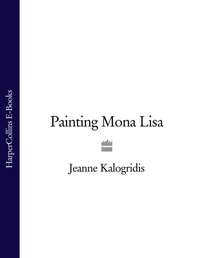
Полная версия
The Scarlet Contessa
Once back in Pavia, eight-year-old Gian Galeazzo and his younger brother, Ermes, moved into their father’s luxurious bedchamber, while their mother, Bona, declared herself regent and formally assumed power until Gian Galeazzo reached his majority. She spent her first day back privately consulting Cicco in the duke’s gloriously appointed study.
She summoned me briefly to the study, where she sat at Galeazzo’s huge ebony desk. The new regent of Milan looked haggard and distracted by numerous worries; at the same time, there was unmistakable relief, even lightness, in her gaze and bearing.
As Cicco looked on, Bona handed me a letter. I glanced down at it. It was dated the twenty-fourth of December, and it bore the signature of the abbott of the monastery of San Marco in Florence.
“You will be allowed to bury your husband at San Marco,” Bona said gently. “I have made arrangements for your travel. When you arrive in Florence, you will stay at the convent of Le Murate.”
I put my hand to my mouth in an effort to stifle a sob, but failed altogether. Bona rose from Galeazzo’s desk and wrapped her arms around me as I wept.
Late that afternoon, I resorted to subterfuge by asking Francesca to pack my things and leave them in Matteo’s room. After nightfall, when Caterina was fast asleep, I went to my husband’s chamber and retrieved his secret papers and the little black pouch containing the mysterious brown powder, and slipped them into the trunk Francesca had filled with my things.
At Caterina’s insistence, I lay beside her in her feather bed, and woke well before dawn. Happily, Galeazzo’s daughter did not stir, but lay so silent I could not hear her breath. I slipped from the bed, dressed quickly, and hurried down to Matteo’s chamber. Just before sunrise, a pair of grooms came to take my trunk, and the three of us headed for the stables. The cold, light mist settled upon my cheeks and eyelashes.
My covered wagon was waiting. The driver, who before age had taken its toll had been master of Bona’s stables, was a tall, skeletal man with sunken cheeks and a cottony white beard. Beside him sat his aged wife, a tiny, equally frail-looking creature with one blind, clouded eye. To my amazement, the driver leapt from his seat and helped the young grooms push my trunk into the back of the wagon with ease. He then caught my elbow and, with an arm thinner than my own, pulled me up into the wagon with impressive strength.
I would have sat beside the pair, but the driver, Gennaro, gestured emphatically for me to sit in the back, and held open the canvas flap for me; he pointed in the direction of the sun, which had just begun to infuse the thick, gathering clouds with a pinkish red glow. The mist would soon turn to cold rain.
I yielded, and crouched low as I moved inside the wagon, half of which was covered with cushions, pillows, and fur throws. The other half bore my trunk, and a coffin fashioned from fresh-hewn, fragrant pine.
I fell to my knees upon the cushions and threw my arms about the coffin as if it were Matteo himself; I put my cheek against the smooth, sanded wood and wept. I had known, of course, that my husband would accompany us, but I had not realized he would travel at my side.
Perhaps later we could go together to Florence.
In the distance, thundered rumbled, and the mist turned abruptly to steady rain. The driver called to the horses; the wagon shuddered and began to sway. I held fast to the coffin, and did not look up until I heard a girl shriek and the horses neigh. I poked my head out through the half-open flap and saw Caterina.
She was barefoot, clad only in her woolen nightgown, her long braid bouncing as she rushed toward the wagon. I watched, stricken, as she waved her arms, her face contorted with grief, and shrieked my name.
“Dea! Dea!”
Her desperation and fear were unfeigned, her voice so heartrendingly shrill that I squeezed my eyes shut.
I retreated back into the wagon and clutched the coffin, sobbing, until distance and pelting rain swallowed the sound of her cries.
Chapter Eight
We traveled southeast across the plain, along the banks of the Po, and crossed the rushing waters at San Pietro, before the river grew wildly serpentine. From dawn to dusk I rode inside the covered wagon next to the pine coffin, my palm pressed to the wood as if it were Matteo’s hand. From time to time, the rain grew deafening as it pelted the canvas, but it stopped altogether as we passed Piacenza’s city walls in the late afternoon; I opened the back flap and glimpsed the region known as the Emilia, its hillsides terraced with vineyards. We did not pause there, but continued half an hour after the sun had set, coming to rest finally at an inn. By then, I was chilled to the bone; the wagon’s interior had been so cold I could see my breath.
There was but one room to be found, so I took the straw mattress while the driver and his wife—who, I learned, was totally deaf—lay snoring upon pillows on the floor. While they slept like the dead, I left the candle burning and delved into my trunk to take out Matteo’s papers. I meant to slip them into my cloak, intending to read them the next day, but was so restless that I began to read On the Egyptian Mysteries, attributed to Iamblichus.
I did not read for long. It had been four years since I had applied myself to Latin, and my understanding was at times wanting, but what I understood frightened me. Iamblichus spoke of pagan gods, demons, astrology—and a personal demon whose name could be known by studying one’s natal stars. Worse, it spoke of telling the future: Ecstasy or alienation of mind is the basis of divination, also the mania which accompanies disease.
Troubled, I soon left off reading. Even so, I slipped the papers into my cloak; if Matteo had thought this subject worthy, I was obliged to understand why.
The next day we passed Parma, and more carefully terraced rows of grapevines, bare and gnarled in winter. I had no opportunity to read more; the elderly wife had begun to cough, and I made her lie in the wagon beside Matteo while I sat beside the old driver and stared at the nearby Apennine Mountains, forested with bare-limbed chestnut, beech, and oak.
That night we stopped some hours past Modena. This time, the accommodations were better, and I had my own room. I stayed up quite late rereading Iamblichus; at the manuscript’s end was a letter in the vernacular, written in the same modern hand that had provided the translation of the ancient Greek ritual, yet not part of it.
To my beloved, it said,
This is in reference to the ritual I sent for your edification, in hopes it—and this translation of Iamblichus of Syria, a follower of our dear Plato—will set you well upon the path to union with the Divine.
The ritual predates both men by centuries, but was assuredly used by them and their students. Its purpose: to invoke the personal daemon, as the Greeks called him; we know him better as the Holy Guardian Angel, that divine inner genius which guides our soul surely to union with its Creator. For God cannot be grasped through the mind, or through contemplation alone, but through the heart, which is exalted in ritual. As a pagan, Iamblichus was not blessed with the knowledge of our Savior, and so much of his writing reflects this ignorance, but much of it is of great use to us today. I am of the belief that God granted His grace even to the heathens, in order that those ignorant of Christ yet men of good will could come to know Him through the dedicated practice of the rite of the Bornless One.
How shall we know, you ask, whether the ritual has been successful? Heed Iamblichus, who says, “The arrival of the archangels is preceded by the appearance of light.”
Of the angel, I must say little, for each man has his own, and each soul must travel its own path to divine union; one man’s salvation cannot be another’s. It is therefore imperative that once you have attained conversation with the angel, you speak of it to no one, lest you fall into the error of believing that you alone have a special connection to the Divine, or that the lessons meant for you alone should be inflicted upon others.
As for the precious contents of the little bag: Immediately before commencing the ritual, take half a small spoonful, no more; use wine to cut the bitterness. See that it never falls into the hands of the profane, or is used wastefully. This, too, must be accomplished in strict privacy, and never be mentioned to outsiders.
May this rite, which was handed down to us by the ancients, guide you to a greater knowledge of the One Who created us all.
In eternal friendship,
Your servant,
Marsilio
On the third day, the wife was so ill that she lay coughing all day inside the wagon; I sat beside the driver again as we skirted the mountains. The weather was dry, sunny, and mild, and remained that way on the fourth day. We stopped at other inns, but I read no more; the letter by the mysterious Marsilio had assuaged some of my fears, but raised other uncomfortable questions. I remained puzzled, confused, thoroughly intrigued.
Late on the morning of the fifth day, we passed over a series of gentle hills; at the apex of the last one, I spied Florence, nestled in the basin below, and let go a gasp of appreciation. Beneath a dazzling blue sky, the city looked golden, its southern flank bisected by the winding silver Arno. As we descended, the separate rooftops grew distinct, and the driver, who knew the city well, began to point out landmarks. The greatest of them, dominating the skyline, was the vast orange-red dome of the great cathedral, Santa Maria del Fiore, Our Lady of the Lilies, matched in height only by its slender campanile; farther south lay the tower of the Palazzo della Signoria, the Palace of Lords, seat of the city’s government.
Most of the buildings were made of stone—some of the costly pietra serena, a dove gray rock that turned shimmering white in the strong sun, others of a pale brown or gold. Some were of stucco, but almost all had the same orange-red brick roof and were built in the classical style, which lent a pleasant uniformity. Perhaps it was the light or the clement weather or the languid hills that embraced the outskirts, but I judged Florence to be the prettiest city I had ever seen. Next to it, Milan seemed drab and cold and dirty.
We passed through the northern gate onto the broad, cobblestoned Via Larga, swarming with pedestrians, wagons, carriages, horses, and street merchants; the sun hung at mid-heaven, and all over the city, church bells were chiming to mark Sext, the sixth hour after sunrise. From the upper-floor windows of all the buildings, fluttering banners hung. Most bore the city standard, a bright red fleur-de-lis against a white background, or the Medici crest, a gold shield adorned with six balls, five of them red and the topmost blue, with tiny gold stylized lilies.
I was so exhilarated that I wanted to keep riding, but we arrived at San Marco all too quickly, and the wagon wheels slowed to a stop at last. I was disappointed; I had wanted a cathedral with a great dome and tall spires for Matteo, but instead saw a spare single-nave church with a bland stone façade, and tucked next to it, a square, plain, two-story cloister. I climbed down from the wagon, my legs wobbly from disuse, and waited with the horses while the driver entered the monastery.
He returned with a lay brother, Domenico, a cheerful young man with red curls who wore a white tunic and scapular beneath a black cape that fell below his ankles. Domenico led me just inside the cloister, to a public area known as the chapter house. He explained in a whisper that San Marco’s church and convent had been some two hundred years old when Lorenzo de’ Medici’s grandfather, Cosimo, paid for their renovation thirty years earlier; the crumbling wood and mortar were replaced by the more durable and handsome pietra serena and cream stucco.
I sat, only half listening as Domenico spoke in hushed tones. He told me that the abbot was expecting me, and that the next afternoon at None, the ninth hour after dawn, a service for Matteo would be held in the sanctuary, followed by burial in the churchyard. I left, relieved that I had survived the discussion without tears, and returned to the waiting driver, his wife, and the now-empty wagon.
We continued south down the wide Via Larga and the driver continued his narration. He pointed out the home of Lorenzo the Magnificent, an unremarkable, square, three-story fortress of stone, with the Medici banner hanging from every window.
The driver pointed straight ahead. “And that way lies the church of San Lorenzo, where Lorenzo’s father and grandfather are buried.”
We rolled past similar palazzos and gardens, then artists’ workshops, goldsmiths, and jewelers. Not long after, we approached the massive cathedral of Florence, also called the Duomo because of its magically unsupported dome, the largest in all the world. Across from it stood the pale stone octagon of the Baptistry of Saint John, its gilded bronze doors dazzling in the sun.
We turned east to drive alongside the long stone spine of the cathedral, and followed the road as it curved due south again. Eventually, we came to a grim, four-story fortress with a crenellated tower, which housed the city magistrate; there we veered sharply left onto the Via Ghibellina. A few minutes later, the driver pulled the horses over to the curb.
“The convent of Le Murate,” he announced, and hopped down from his seat to help me down.
I descended to find a long expanse of stone wall broken by a tall, narrow wooden gate. Two rusting iron grates, one at the level of my eyes, the other of my ankles, were set into the door; the uppermost grate was covered on the inside by a black cloth. While the driver waved down a street lad to help him fetch my trunk, I clanged the brass knocker and called out softly; as I did, I caught a sudden whiff of vinegar and felt inexplicably nauseated.
Within a few minutes, the gate opened far enough to allow the driver to shove my trunk inside the door, though he was not allowed entry himself. He promised to come for me the next afternoon, and as I passed through the convent walls I saw the vinegar—used to prevent plague—in a bucket that held alms thrown through the grate by passersby.
Le Murate was old but in good repair and very clean; the furnishings were spare but elegant and comfortable, even by the court of Milan’s standards. The abbess, who had received Bona’s letter, welcomed me personally and gratefully accepted the duchess’s generous donation, which I pressed into her palm. Even so, the place evoked a strange anxiety in me.
I went at once to the cell assigned me, closed my door, and studied the star rituals written in Matteo’s hand. “For banishing,” he had written beneath the first, “start here.” I was not certain I wanted to know what needed banishing, but the alternative was to sit and think deeply on the funeral that was to come. I chose instead to practice drawing the five-pointed stars in the air with my index finger, the way I had seen Matteo do it in the darkness. I began, also, to memorize the strange words that went with the banishing. I did not emerge from my cell until supper; afterward I walked the grounds alone, and came upon the carefully tended gardens. In the center of them stood an unusual tree: a cedar, as tall as four men standing upon each other’s shoulders, its branches broad and sweeping.
The sight jolted me, as if I had seen Matteo himself standing there. I hurried to the tree and reached past the bristling blue-green needles to press my hand to the bark; it was ridged and rough, as I knew it would be, though I had supposedly never seen such a tree before. I leaned against it and drew in its pungent fragrance; tears came to my eyes as I heard a woman’s voice whisper in my memory.
A cedar of Lebanon.
My mother’s voice. The convent’s outer walls loomed close and began to spin; I closed my eyes, panicked. The Duomo’s red cupola, the cobblestoned streets, the whitewashed convent walls, even the grates on the door and the smell of vinegar . . . hadn’t I recognized them all?
I do not know this place, I told myself firmly, and hurried back to my cell through halls grown terrifyingly familiar.
That night, I silently performed Matteo’s banishing ritual, and did not emerge from my cell until the next day at half past two, when it was time to leave for my husband’s funeral.
The driver delivered me to the main entrance of the church of San Marco, where the redheaded Brother Domenico waited for me. He led me into a modest chapel, where a small candelabrum burned in front of a magnificent altarpiece painted with a scene of the Last Judgment. Nearby, a balding priest was lighting coals for the censer, muttering prayers as he did so. Two monks in white tunics and black capes stood together just left of the altar, and lowered their gazes as I entered.
As the church was the recipient of the Medicis’ charity, there were wooden chairs for the worshippers. In the last row sat a tall, spare woman dressed in a rich but modest gown of dark gray velvet; her face and bowed head were veiled in black silk gauze. She did not look up as I passed, but kept her head inclined toward the rosary in her prayer-steepled hands.
Domenico deposited me in my seat, in the first row directly before the altar, and departed without a word to the woman. The priest sprinkled frankincense upon the now-hot coals, and put the lid on the censer; smoke streamed out through the holes. Swinging the censer from a chain, he made his way down the aisle, chanting. I turned as the door to the chapel opened and Domenico and five other men carried Matteo’s casket as far as the threshold. There they waited while the priest censed the casket, then took a brass asperger from the font by the door and sprinkled Matteo with holy water.
As he did, the two monks by the altar began to sing a hollow, aching melody.
De profundis clamavi ad te, Domine . . .
Out of the depths have I cried unto Thee, O Lord . . .
The priest then led the slow procession into the chapel. I turned away, struggling to contain my tears, and did not look at the coffin again until the priest took his place at the altar, and the pallbearers gently set the casket down a few steps from him.
For the first time, I noticed the pallbearers. One was Brother Domenico and two others his fellow monks. But three of the men were wealthy gentlemen, given their exceedingly fine but unostentatious clothes. The first was small and delicate-looking, with graying red-gold hair; the second was Matteo’s age, young, handsome, dark-haired and muscular. And the third was Lorenzo de’ Medici.
At the sight of Lorenzo, my tenuous grip on my emotions failed. Tears spilled from me, hot and fierce. I remembered Matteo’s suffering on that last horrible night; I thought of how Lorenzo must have waited for him and finally realized that something had gone horribly wrong.
I heard Matteo’s ragged whisper: Tell Lorenzo . . .
I remember little else of the ceremony—only the sacred Host dry upon my tongue, and the priest circling the coffin twice with more incense, more holy water. Only when it was over, and the pallbearers returned to take the coffin, did I realize that they had been sitting behind me the entire time.
The priest caught my arm and led me after the coffin; as I left the chapel, the tall veiled woman rose and stood respectfully.
We went to a deep hole flanked by a large mound of reddish dirt in the churchyard; the gravediggers were waiting for us, leaning on their shovels. The coffin was set upon ropes, which the diggers used to lower it into the ground. Matteo was laid to rest so that his head lay due east of his feet, since Christ would appear in the eastern sky when He returned to raise the dead.
Lorenzo and the younger man flanked the veiled woman, their arms wound about hers in support; the delicate middle-aged man stood on Lorenzo’s other side and dabbed at his red-rimmed eyes. They remained a short distance from me, as if unwilling to intrude on my grief.
I listened, dazed, as the priest spoke of Saint Martha and her profession of faith that her brother would indeed rise from the dead.
At last, the priest made the sign of the cross over the grave, and chanted: Requiem aeternam dona ei, Domine, et lux perpetua luceat ei . . .
It was over. At the priest’s prompting, I clutched a fistful of cold, wet soil and sprinkled it onto Matteo’s coffin. The other four mourners watched me, hesitant. I turned to them, gesturing at the mound of earth.
“Please,” I said.
The woman was first to add her handful of dirt; the men followed. Once I had handed a coin to the priest for his services, and a purse for the monastery from Bona to Brother Domenico, the gravediggers took to their work with haste. I turned to the others.
“Ser Lorenzo,” I asked, “may I have a private word with you?”
He nodded, and moved to my side; the others retreated a few steps, while Lorenzo led me over to a bare-limbed tree, swollen with pink-red bud in response to the unusually mild weather. I tried not to flinch each time a clod of earth struck Matteo’s coffin.
Конец ознакомительного фрагмента.
Текст предоставлен ООО «ЛитРес».
Прочитайте эту книгу целиком, купив полную легальную версию на ЛитРес.
Безопасно оплатить книгу можно банковской картой Visa, MasterCard, Maestro, со счета мобильного телефона, с платежного терминала, в салоне МТС или Связной, через PayPal, WebMoney, Яндекс.Деньги, QIWI Кошелек, бонусными картами или другим удобным Вам способом.





